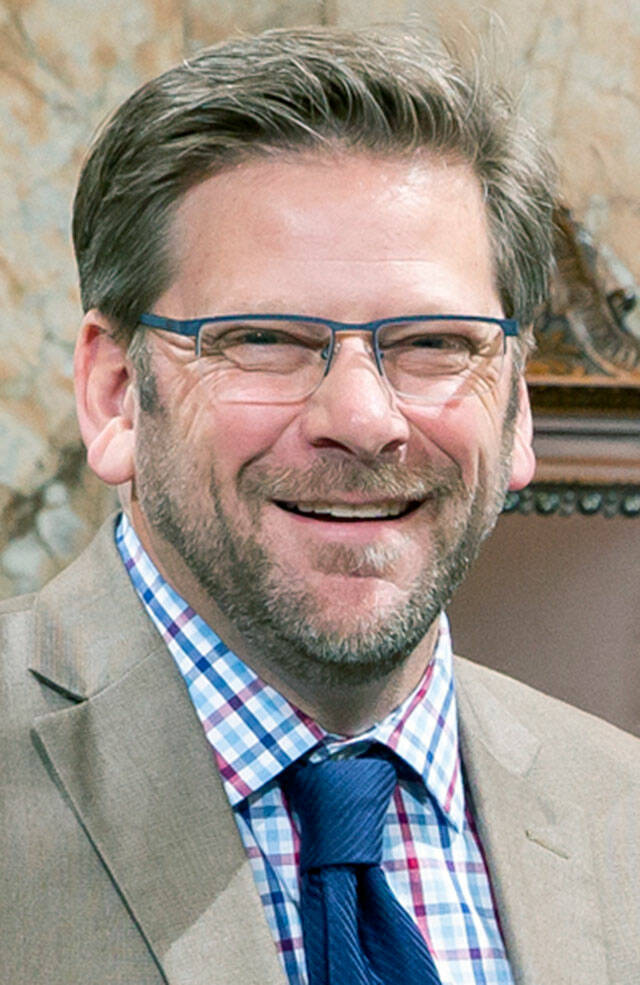OLYMPIA — State lawmakers approved establishment of a school construction seismic-safety grant program with $100 million to start as the 60-day legislative session drew to a close.
Last week’s end of proceedings included approval of a contentious ban on the sale of high-capacity gun magazines but continues to allow possession up to 10-round clips.
And lawmakers exempted small businesses from paying the business and occupation tax, a boon, 24th District legislators said, to rural areas like Clallam and Jefferson counties, represented by state Sen. Kevin Van De Wege and Reps. Mike Chapman and Steve Tharinger.
“That’s a big deal,” Tharinger, a House Appropriations Committee member and the Capital Budget Committee chair up for re-election in November, said Monday.
“It affects around 75 percent of the businesses in Washington.”
The Port Townsend resident said the tax credit, which eliminates the tax for businesses with less than $125,000 in gross receipts, is projected to cost $131 million in revenue over four years.
“Long term, we have to look at that,” Tharinger said of replacing that revenue.
Tharinger said a legislative tax-reform working group may recommend eliminating the B&O tax entirely in time for consideration in the 105-day session that convenes next January.
Businesses should be able to make investments in advertising and research and development before paying the tax, he suggested as an example.
“They have to come to the Legislature to get an exemption, and that’s just crazy,” Tharinger said.
“If there was a business income tax, they would be able to subtract that from gross receipts and pay the tax on the net.”
The policy-only seismic-grant bill, which passed unanimously in both chambers — $100 million in grant funding was approved in the capital budget — awards grants to schools in high seismic-hazard areas like those in Clallam and Jefferson counties.
“The challenge is, it’s a long-term issue just as school construction in general is a long-term issue,” Tharinger said.
He said more funds would likely be included in the 2023 legislative session that begins in a little more than nine months.
The grants cover at least two-thirds of a project’s cost, leaving the balance to be covered by recipient school districts.
An advisory committee appointed by the Office of the Superintendent of Public Instruction will prioritize applications “that achieve the greatest improvement in school facilities,” according to the bill report for Substitute Senate Bill 5933 (leg.wa.gov).
The superintendent of public instruction must propose a list of prioritized grants to the governor by Sept. 1 each year, beginning this year, for submission to the Legislature.
Program advocate Jim Buck of Joyce, a former 24th District state representative, said $400 million may be available over the next four years.
“It’s time to celebrate a bit,” he said Monday.
School districts have between June 30, when the legislation goes into effect, and Sept. 1 to put grant applications together, he said.
“I doubt very seriously if they will have that many grant applications,” Buck predicted.
“This is something that the public is going to have to demand,” he said.
“The Legislature ain’t gonna do it without the public demanding it.”
“There’s a limited amount that OSPI can do without legislative direction,” Buck added.
“This will be a learning experience, and hopefully we can learn a lot from Oregon, [British Columbia] and California,” Buck said, citing places where seismic-hazard funding is available.
Chapman, a longtime supporter of the business and occupation tax credit, joined Tharinger and Van De Wege in favoring the ban on manufacture, importation, distribution, sale or offer for sale of any gun magazine that can accept more than 10 rounds of ammunition.
Washington joins California, Colorado, Connecticut, Maryland, Massachusetts, New Jersey, New York, Vermont and the District of Columbia in banning large-capacity ammunition magazines.
Chapman, up for re-election in November, said Washington residents can buy them in other states and bring them home.
“Society is going to continue to wrestle with what we do,” Chapman said.
“Folks may argue they need 20 or 30 rounds of ammo for self protection. If you need that many rounds of ammo, that means a whole army of people are invading your house, and that’s so unlikely.
“Everyone knows the best form of home defense is a shotgun. And you don’t carry 30 rounds in a shotgun.”
Chapman said the ballot box might be a better place to decide issues such as “addressing firearm safety measures to increase public safety,” as SB 5078 purports to do.
“Passions run high on both sides,” he said.
“People have taken this issue to the ballot box and had great success.
“This issue does not seem to be suited for the legislative process. Really, the time it takes between amendments and emails and public input, it’s one of those issues that may be best left for voters to decide.”
The Port Angeles resident said the $32 million project to replace the Elwha Bridge remains on track to get started with construction this year.
He said lawmakers approved $100 million in pandemic response funds for restaurants and established a “historically large” rainy day fund equal to 21 percent of state revenue.
The $17 billion Democratic Party proposal that was approved — Tharinger, Van De Wege and Chapman are Democrats — includes $2.4 billion for culvert replacement and $1.6 billion for ferry operations and capital expenditures, Chapman added.
It also includes $30 million for improvements to the U.S. Highway 101 Sequim-to-Blyn corridor, which may include roundabouts.
“That’s big for Sequim,” Van De Wege said.
“It’s going to be good for the east end of Sequim and make 101 a lot safer,” the Sequim resident said.
“All in all, it was a good session. We did a lot of good things.”
________
Senior Staff Writer Paul Gottlieb can be reached at 360-452-2345, ext. 55650, or at pgottlieb@peninsuladailynews.com.

